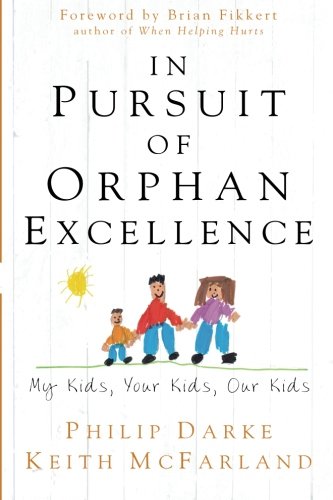 I recently read In Pursuit of Orphan Excellence by Philip Darke and Keith McFarland. It had been sitting on my bookshelf since before we brought Dumpling home, but I just didn’t have the time to read it. I’m so glad I finally sat down to read it though because wow, it’s a powerful book. It is a collaborative effort of 15 total authors, all sharing important knowledge from firsthand experience in the orphan care community. The book addresses the worldwide social issue of caring for the orphans who won’t be reunified with biological families, have no options for kinship care, or are not “adoptable” for many other different reasons. It addresses all the orphans who are left behind with no alternatives. In my opinion, this is a must-read for anyone in the orphan care community.
I recently read In Pursuit of Orphan Excellence by Philip Darke and Keith McFarland. It had been sitting on my bookshelf since before we brought Dumpling home, but I just didn’t have the time to read it. I’m so glad I finally sat down to read it though because wow, it’s a powerful book. It is a collaborative effort of 15 total authors, all sharing important knowledge from firsthand experience in the orphan care community. The book addresses the worldwide social issue of caring for the orphans who won’t be reunified with biological families, have no options for kinship care, or are not “adoptable” for many other different reasons. It addresses all the orphans who are left behind with no alternatives. In my opinion, this is a must-read for anyone in the orphan care community.
It begins by discussing one of the biggest social issues in our world today – fatherlessness. Not simply orphan status, but fatherlessness in general. Darke explains the societal problems that have arisen in the U.S. as the rate of fatherlessness has increased. Did you know that 42% of American homes are fatherless? It makes sense given the divorce rate but it’s simply astonishing. He goes on to share why everyone needs to care about fatherlessness because of the negative impact it has on society in general.
The authors then explain that we have the opportunity to care for orphans – it’s not a “we have to” … it’s a “we get to” scenario. They explain that we are the plan for orphan care! But simple caring for physical needs is not enough – all people, including orphans, need and deserve relationship in order to thrive. They even quote Dr. Purvis and share about attachment training and the brain chemistry – all interconnected to relationship.
The authors also share in great detail about how to improve the standard of living for all orphans across the globe, meeting both physical and emotional needs. Although many children will not have the ability to be adopted, they argue that all children need a family-like environment where they are spiritually adopted and/or have a close mentor. They lay out plans for what that might look like in different environments. They explain the importance of community integration, proving that orphans do, indeed, need to be an integral part of their local communities in order to build a healthy sense of self. They argue against being hidden away in a safe haven, but instead explain the need to interact with their local people and experience their native culture. They go on to explain at length how to address the different physical needs of these precious children, including nutrition, preventative, restorable, and emergency health care. They also talk about education, with an emphasis on making sure that local culture is always preserved.
They also discuss the importance of creating self-sustainability and self-sufficiency within the orphan care community. They stress that the communities need to be trained to ultimately rely on themselves and their local communities, to decrease dependency on foreign donations. They also lay out goals for vocational training and internships for the children being cared for. Not only does this give them a sense of worth, it also gives them the skills to ultimately live on their own. They also propose work scholarships and financial training to further set the children up for success in the future.
They finish the book with sharing about cultivating spiritual formation in the children. They stress the need for the children to have a relationship with their Heavenly Father so they can feel and know that intimacy. The authors discuss the need for strong Christians to lead the children in their faith, so they can learn their true sense of worth and glorify Him in their lives. And finally, they share that through this work, we will glorify Him too. “Ultimately, our goal is to honor our great God and Father who has given us the gift and calling of work and entrusted us to raise sons and daughters who will look to Him for all things.” (Ch 11, pg 184).
If you haven’t read this book, pick up a copy. Everyone should care about the global orphan care crisis and be doing something to help. God calls us to it, all throughout the Bible. Read this book, and I think you’ll see why. It is our problem and we are the solution. For a few, that means adoption. But for most, there are so many other possibilities. Where do you see yourself?






